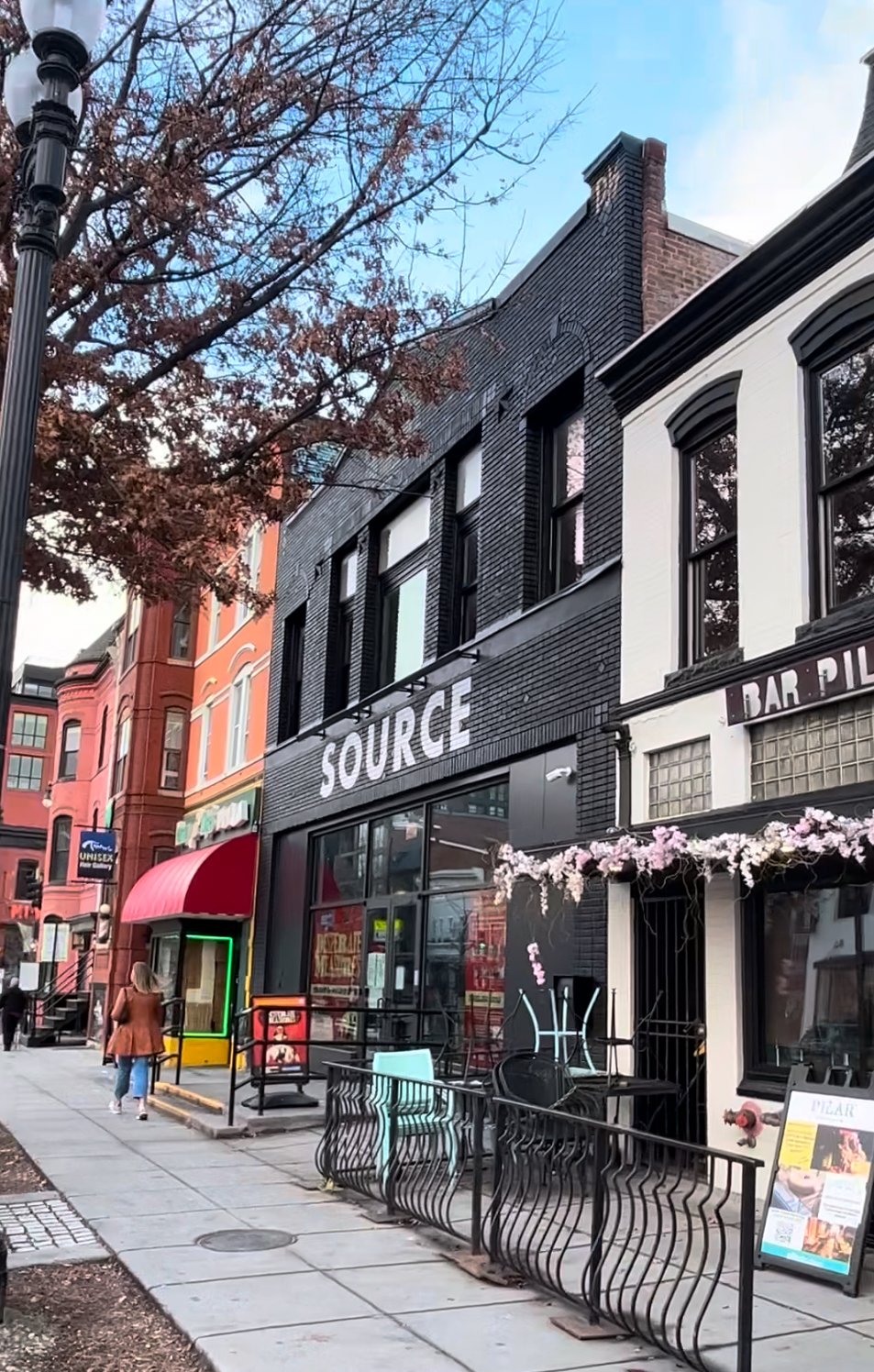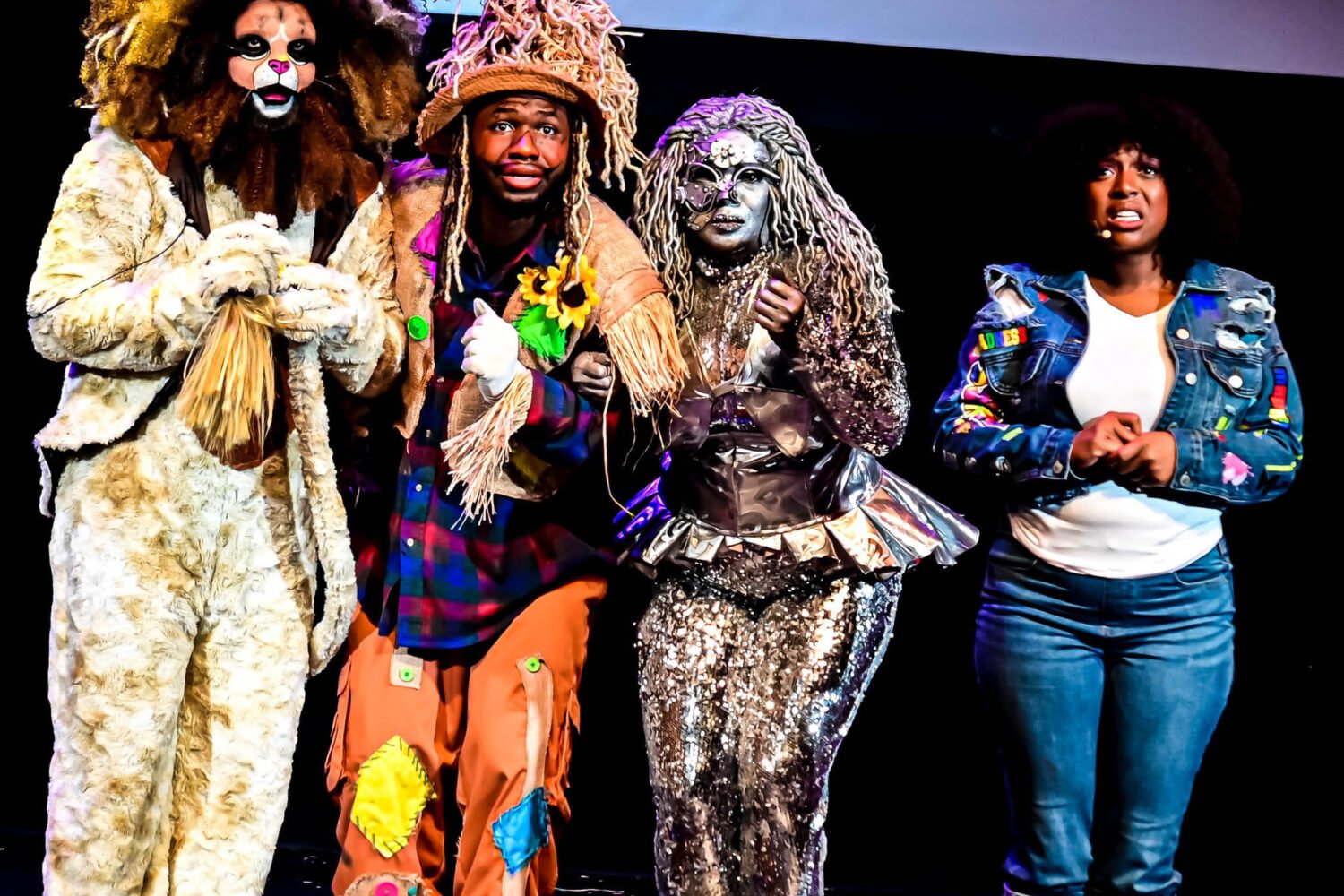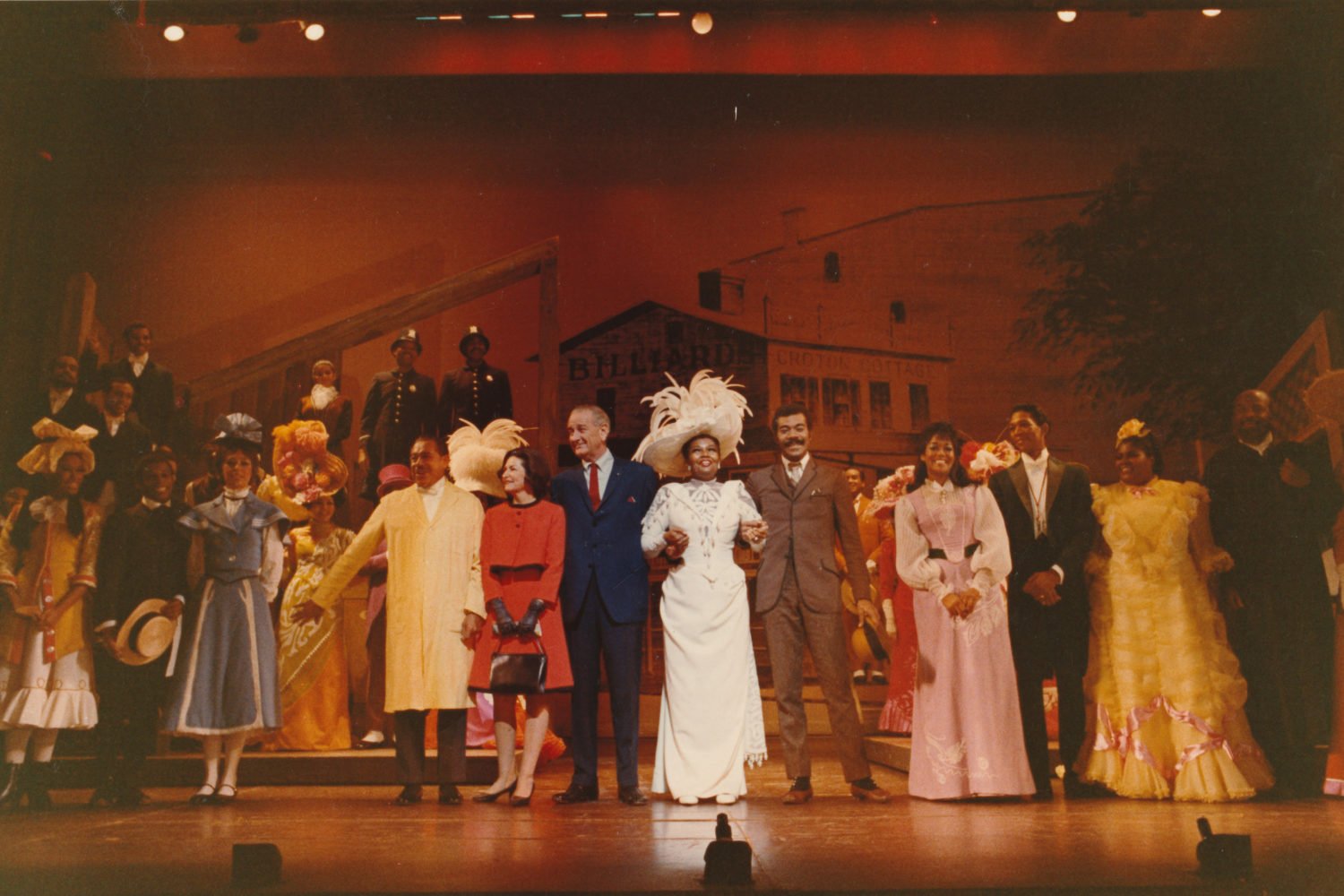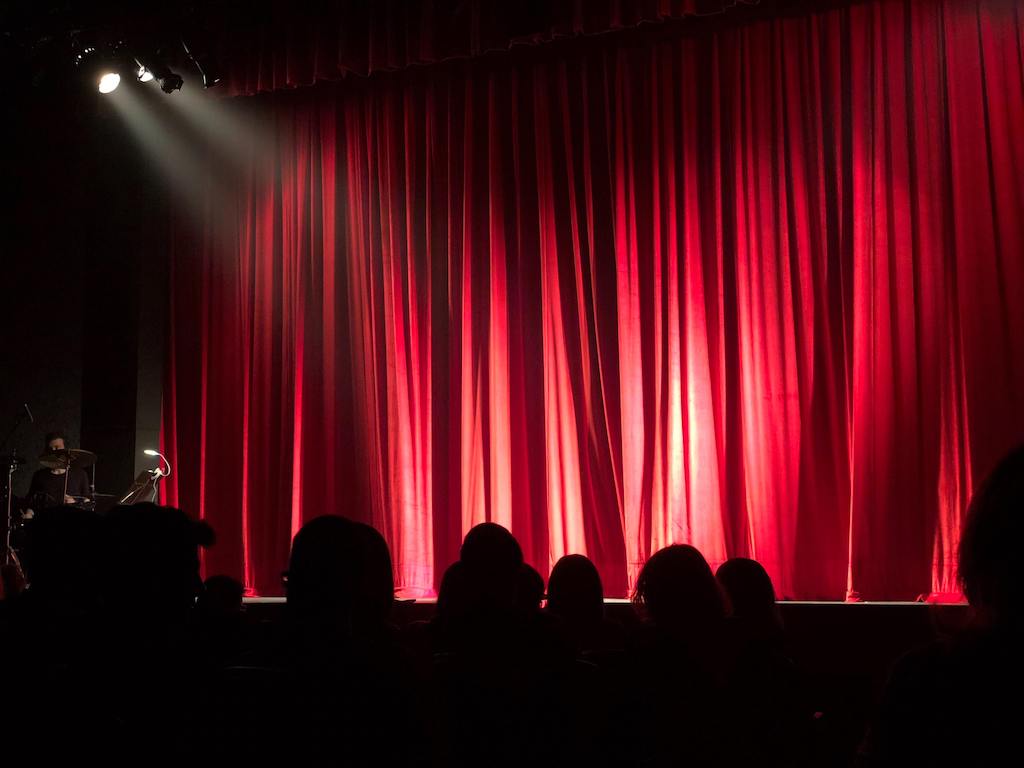The Source Theatre building on 14th Street, Northwest, is up for sale, which could mean the end of the nearly five-decades-old black box theater. A coalition of arts organizations and leaders has emerged to try and save it, through an open letter published by TheatreWashington on November 21. They urge the Cultural Development Corporation (CulturalDC)—a nonprofit that saved the space in 2006 and hopes to find a buyer by year’s end due to its board’s timeline—to sell the Source to an organization that will “maintain it as a theater and operate on a sales timeline that allows for that.” Since then, more than 1,500 people have signed the petition.
Constellation Theatre Company has operated in residence at the theater since 2007, and wants to buy the building. In October, CulturalDC publicly listed the price at $5.8 million. Constellation has offered to buy Source for less—what it believes to be a fair market price based on a building inspection by an engineering firm and a valuation from a commercial real estate firm it commissioned. Constellation says it hasn’t been able to find comparable sales close to $5.8 million, noting that DC’s 2025 real property tax assessment of the space is $3.6 million, and “CulturalDC’s asking price is too high for a nonprofit organization to afford,” says Constellation’s founding artistic director Allison Stockman.
To CulturalDC, Constellation’s offer is not a fair market price based on comparables, and accepting that price would “not allow CulturalDC to plan for our future programming, our staffing, and our overhead costs,” says executive director Kristi Maiselman. The group will consider “all reasonable offers at this time with a view towards securing CulturalDC’s future,” according to board chair Hiroshi Jacobs in a statement released on November 26.
Constellation hopes to buy in 2025 to plan its next season. Stockman says the company’s current home has been ideal: “The magic of the black box theater at Source is its flexibility, its intimacy, and its location. When you’re up close like you are at Source, that hits you with a power that you don’t always get when you’re in a bigger theater.”
If this 120-seat black box theater is lost, TheatreWashington president and CEO Amy Austin says, local theater artists will “lose one of the last viable black boxes for itinerant theater companies in the DC area.” Other black boxes in DC have closed, including the H Street Playhouse’s original space prior to relocating and becoming Anacostia Playhouse, Flashpoint (former home of the Mead Theater Lab), and Warehouse Theatre. There are spaces at Atlas Performing Arts Center, DC Arts Center, Capitol Hill Arts Workshop, Studio Theatre’s fourth floor black box, and others in Maryland and Virginia that are sought out by companies without permanent homes, but those are often booked up, or are too big or too small.
Negotiations: From the open market to the open letter
Discussions between CulturalDC and Constellation around the sale of the building began in May, according to Constellation’s managing director Anderson Wells. The initial offer was for Constellation to purchase the first floor. A second conversation about buying the whole building happened in mid-June. Then, they found out the price in an August 13 email, which led them to start raising funds to buy the building.
In August, CulturalDC announced to residents that it planned to put the Source building on the market. In late September into mid-October, before CulturalDC put out the listing, CulturalDC worked with Constellation to give them the chance to make an offer. They also began reaching out to other organizations. The public listing went live in late October 2024, which stated that CulturalDC wanted to identify a buyer by December.
The $5.8 million list price, Maiselman says, was a discount: its broker’s high-end valuation was $6.2 million. People inside the theater community took note that some of the documents included with the listing mentioned the potential of removing elements like risers for audience seating and prioritizing mixed uses for the space.
Austin decided it was time to release an open letter in November, because both organizations were running out of time for the December deadline, and an open public meeting about how to broker the sale never happened.
“Every month that passes, it becomes more urgent,” she says. “From my point of view of wanting to keep it as a theater, [the short timeline] doesn’t provide a lot of opportunity to bring stakeholders together and to have conversations with funders, with philanthropists, with theater audiences, with the government: to bring everyone in the same room and say ‘How can we transfer this space in a way that’s good for CulturalDC and it gets to remain as a theater space, which it has been for 50 years?’ ”
According to Maiselman, the organizations have been discussing the sale since May and are still actively negotiating. CulturalDC, she says, “would love nothing more for them to finalize and be able to complete a purchase of the building”—but the organizations had an understanding that at a certain point without a letter of intent to purchase the building, CulturalDC would reach out to other organizations. The ball is currently in Constellation’s court, Maiselman says. Constellation increased their offer on November 26.
“We are hoping to come to an agreement with them, but as you can imagine, the board wants to ensure our own financial future and sustainability, and therefore has to continue to market the building more broadly in the event that we cannot come to an agreement with Constellation,” Maiselman says.
Changes at Source over the years
It’s not the first time the space has been in jeopardy. Originally, it was where Source Theatre Company operated for 33 years. The company was founded by the late Bart Whiteman during the small theater movement of the 1970s; he turned an abandoned car dealership into the District’s first non-Equity theater—a place where many emerging artists got their starts.
In 2006, when the company shuttered, CulturalDC saved the space, transforming it into an arts center with rental space. Only the name Source survived. Stockman, who was then directing for the Washington Theater Festival and opera company IN Series, was part of that first Save Our Source movement. Over the years, Constellation, IN Series, Washington Improv Theater, one-off productions, and CulturalDC projects used the space.
Pre-pandemic, Constellation had explored the idea of owning its own space since 2019, which would grant them freedom and stability in programming that’s sometimes difficult with a landlord controlling the schedule in a shared space. When Constellation returned to Source post-pandemic, the company was just glad to be back in the space.
But over the years, CulturalDC saw a decrease in the demand for the space, not only from its own residents but also the broader theater community. Maiselman says that since Covid, the Source has seen increased vacancy and cancellations. Occupants have shifted programming to get free or low-cost space downtown in vacant buildings.
“Our hope has always been that Source remains a venue for arts organizations, and serves multiple disciplines, organizations, and artists,” Maiselman says. “Less and less, we’ve been able to use Source, our own venue, for our own programming. Where we have found success for our own programming is not necessarily in this building as a black box theater.”
The nonprofit supports artists across all disciplines and makes their work accessible to audiences. It helps DC arts nonprofits find space via real estate partnerships and supports and funds its own visual arts and multidisciplinary programming. This includes its free Mobile Arts Program, which brings art galleries to people all over DC; its Capital Artists Residencies for visual artists; and its Torrents program for interdisciplinary Black performance and visual artists.
Two years ago, CulturalDC shared with resident organizations that it was thinking about renovating the building to serve multiple disciplines, including the visual arts. That was when Constellation started searching more seriously for a new home, though it had looked over the years for other affordable and Metro-accessible spaces. “One way or another, we were building some kind of contingency plan,” Wells says.
In December 2023, Stockman and Wells met with Maiselman to discuss adjustments to the proposed renovations, so the performing arts and the proposed art gallery could work in tandem, which they felt optimistic about. Then, Maiselman shared that they were no longer going to do the renovations. What CulturalDC thought could be a one- to three-year capital campaign to renovate the building would be a much longer renovation because the DC Commission on Arts and Humanities (CAH) proposed changes in rulemaking for large capital grants and the DC Council put the program on hold in February 2024. Maiselman notes from her experience working with CAH that the changes died in the city council after being submitted for approval in December 2023.
Stockman says that CulturalDC’s changing goals and timelines over the past several years have made it “very difficult for any renters, current or future, to plan on occupancy in the building.” Between not renewing Washington Improv Theater’s lease and CulturalDC’s changing renovation plans, Stockman notes that “vacancies are partially because the idea of whether or not it’d be open has been changing. When WIT left, office space also got emptier.”
Maiselman says that CulturalDC has “always prioritized our current tenants and current resident organizations,” and with factors beyond their control that impacted the renovation timeline, CulturalDC “acted in good faith and [we] have been as transparent as possible with respect to renovation plans. I agree that it has been challenging, but it’s been beyond our control, and we have worked with them to communicate at every step of the process on the status.”
Visions for Source’s future
Constellation’s idea is to create a shared performing arts space used by multiple organizations, including companies that have been in the building like IN Series, and others that regularly need space, such as Irish-focused arts company Solas Nua. Stockman said that even at this early junction, Constellation would love to hear from companies that are interested. Constellation hopes to figure out potential needs when the CAH releases the results of a space survey that has been in the works since 2022.
“We don’t want to program all 52 weeks of the year,” Stockman says. “Having other organizations in there would be great practically and idealistically. Source is a neighborhood anchor, so we can make that community stronger by keeping it full of action.”
The building is zoned for the arts, though it is mixed-use, and artists have mentioned worries about it being revamped into retail or a restaurant. CulturalDC’s hope is for the building to remain within the arts, with plans outlining a desire to sell to a “like-minded organization or operator, such that it remains within the arts community,” according to CulturalDC’s principal broker, Langdon D. Hample.
CulturalDC has reached out to more than 25 other arts nonprofits and organizations with the hope of Source remaining their space, as well as arts organizations across the East Coast, though no other potential buyers beyond Constellation have emerged.
“I see personally there is huge opportunity in the downtown area. Because there’s so much vacancy, there is a huge opportunity for artists,” Maiselman said. “And if the city could work with landlords to incentivize them, it would be great for landlords to put more arts organizations into those vacancies. Because those buildings will sit vacant for years.”
Maiselman says that a lot has changed since the time that CulturalDC saved the Source. In the years since the onset of the Covid pandemic, theaters in the area and across the country have faced budget deficits, cutbacks, and closures, amid struggles for audiences to return in the same numbers as before, and many were forced to think about space in different ways. The board does not believe owning the Source building is a good investment—and wants to invest in other areas of revenue, like its visual arts programming.
“We’ve been losing revenue on Source; we’ve lost direct revenue as it relates to rentals and occupancy,” she says. “As leadership changes, organizations change, even though the mission may not directly change. I think new leadership brings changes in programming.”
Stockman says that if the space is indeed lost, she isn’t sure where the company would continue to operate, and it would change the 14th Street neighborhood. And for emerging artists and companies of now and the future, the loss would be felt, both Stockman and Austin said.
“There’s been so much theater that has been produced there, and so many artists launched their careers there, and so many productions that have stood the test of time in our memories,” Austin says. “We want Source Theatre to continue as a home for the next generation of artists. It’s a place for people to find their identity as an artist, and as an arts hub, a place for multiple theatre organizations to thrive.”
Editor’s note: A different version of this article was published online several weeks earlier. This reworked article has additional details and sourcing, and has corrected some errors in the previous article.
















